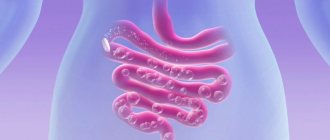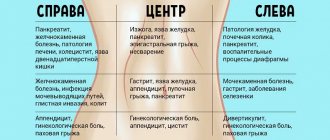Physiological causes of seething
Even healthy people often experience strong rumbling when they overeat or drink carbonated water. There are many natural causes that cause constant rumbling in the stomach in adults:
- Hunger. The stomach growls loudest if you do not eat for 5-6 hours. However, some people experience severe bubbling even 1-2 hours after breakfast in the morning.
- Visual stimulation. The stomach may growl if a person sees beautifully decorated dishes or smells a favorite aroma. This will provoke certain reactions in the head.
- Binge eating. With constant abuse of food, rumbling becomes a chronic symptom. Particularly severe discomfort can be experienced if you take long breaks between meals and then eat to your heart’s content.
- Stress, anxiety and other strong emotions. Exams, speeches, negotiations and other important events can trigger intestinal spasms, which will cause boiling.
- Certain foods. Each body is different, but sparkling water, legumes and cabbage provoke rumbling in most people. Sometimes bloating and even pain develop along with it. Alcohol is also a provocateur of unpleasant sensations.
- Staying in a certain position for a long time. Rumbling in the stomach is often observed in those who sit with an uneven back. As a result, the stomach and intestines are compressed, which can cause discomfort.
- Individual characteristics. Due to powerful and rapid peristalsis, some healthy people experience strong bubbling sounds.
Similar signs are possible in women before menstruation. Hormones change the state of smooth muscles, which causes discomfort.
In some cases, rumbling is the result of a lack of certain vitamins, minerals or enzymes. This occurs in people who have an unhealthy or monotonous diet and consume few fruits and vegetables.
Causes of rumbling in the stomach
Rumbling can occur regardless of the time of day or night, as well as the age of the person. If you ignore breakfast in the morning, your stomach will growl for several hungry hours until it finally receives the required food. Morning sweet coffee is not a complete replacement for breakfast, so those who prefer this drink to a portion of healthy food should be prepared for the fact that their stomach will soon begin to growl. Sometimes rumbling can occur even if a person is full, but he sees or smells dishes that are tasty to him. This is explained by sending a signal from the brain to the gastrointestinal tract to start the production of gastric juice, since the visual or olfactory desire to taste food provokes this process. This rumbling in the stomach no longer comes from the stomach, but from the intestines.
Another cause of rumbling in the stomach can be overeating, especially after 4 or more hours of fasting. The likelihood of this symptom occurring also increases when consuming a fatty and heavy assortment of dishes, since such food causes the formation of a bolus of food in the gastrointestinal tract, which, moving along its path, enhances peristalsis. This is necessary for the purpose of better grinding and processing of food, but at the same time the process also provokes rumbling.
Content:
- Causes of rumbling in the stomach
- Diseases that cause rumbling
- Actions for rumbling stomach
Also, the stomach may begin to growl due to stress, anxiety, or consumption of certain foods or drinks, which can be individual for each organism. Very often this symptom is caused by carbonated drinks and alcohol. Also, rumbling can be provoked by a certain position of the body - a lying position is most often accompanied by rumbling, in contrast to a standing or sitting position.
Regarding the female body, it is worth considering that this symptom can act as a constant companion to menstruation. This is not a pathology, since on the eve of menstruation, due to physiological changes in the body, the hormonal background completely changes. It delays the rapid flow of metabolic processes, which leads to an increase in blood pressure in the pelvic organs, which provokes the occurrence of rumbling. A similar symptom disappears either immediately after the start of menstruation, or only after its complete completion, which is determined by the individual characteristics of the body.
Diseases as a cause of seething
Pathologies often cause bubbling sensations in the stomach and intestines, but are almost always accompanied by additional signs and discomfort:
- Dysbacteriosis. An imbalance of normal microflora leads to nausea, rumbling, problems with stool, and decreased appetite.
- Gastritis. The pathology often causes an unpleasant symptom and can occur with fever and pain when hungry.
- Acute and chronic cholecystitis. Accompanied by unpleasant sensations on the skin, yellowness of the integument, nagging pain on the left.
- Liver diseases. Almost all liver pathologies provoke pain on the right side, nausea, and can cause bloating and rumbling.
- Crohn's disease and colitis. Intestinal pathologies accompanied by inflammation of one or more sections.
- Irritable bowel syndrome. A functional disorder in which the patient experiences occasional diarrhea and constipation, and suffers from flatulence and bloating.
Other disorders not related to the intestines can also provoke seething and rumbling in the abdomen, and strong release of gases: VSD (disturbance of nervous regulation), intoxication with food or chemicals, pelvic diseases in men and women, as well as adhesions after operations.
Sometimes such sensations are caused by lactose or gluten intolerance - celiac disease and lactase deficiency. Violations are accompanied by a vivid set of symptoms that occur a couple of hours after consuming the products.
Principles of treatment
To eliminate unpleasant symptoms, it is important to establish the root cause of the disease. Treatment involves an integrated approach, which is based on:
- nutrition correction;
- drug therapy;
- herbal medicine;
- physical exercises.
Self-medication is not recommended. In matters of proper diet, the optimal complex of pharmacological drugs, useful recipes of traditional medicine, you should trust your doctor.
Drug therapy
To eliminate pain in the lower abdomen, antispasmodic drugs are prescribed. These include:
- “Drotaverine” (recommended: for biliary/intestinal colic, biliary dyskinesia, cholecystitis, spasms of smooth muscle tissue);
- “Becarbon” (prescribed: for hyperacid gastritis, heartburn, indigestion (dyspepsia), intestinal spasms);
- “Atropine” (eliminates biliary and intestinal colic, used in the treatment of cholecystitis, gastric and duodenal ulcers).
Warning signs
Additional symptoms will signal the development of the disease. One of the most dangerous signs is a combination of acute pain and high temperature, in which case you need to call an ambulance. Other signs that should prompt a person to see a doctor:
- constant belching and heartburn;
- frequently occurring painful sensations of a cutting, stabbing or pulling nature;
- frequent constipation followed by diarrhea;
- nausea and vomiting;
- complete lack of appetite or its gradual deterioration.
In the presence of infectious pathologies and poisoning, symptoms manifest themselves violently.
Intensive development of unpleasant symptoms can lead to exacerbation of chronic diseases. Ignoring them is life-threatening.
Why can the lower back and lower abdomen hurt and what can be done about it?
Lower back pain quite often develops in combination with nagging pain in the lower abdomen.
Of course, such symptoms characterize diseases of the female body to a greater extent. However, it is not so rare for urologists to observe such signs at appointments. In general, pain in the lower abdomen and lower back can indicate many pathological conditions. And in order to begin proper treatment, you should definitely consult a doctor who is a specialist in this field.
During the examination, the doctor first of all pays attention to the intensity of the pain and its nature. It can be sharp or aching. Sometimes it is accompanied by an increase or, conversely, a decrease in body temperature, vomiting, and bleeding. If the patient is a woman, then the doctor must find out whether the pain is related to pregnancy or the menstrual cycle.
Diagnostic methods
Since rumbling in the stomach is a gastroenterological symptom, you should first contact a gastroenterologist. The doctor will prescribe studies and tests that will help determine the need for consultation with other specialists. Be sure to prescribe:
- biochemical and general blood test;
- bacteriological culture of stool;
- test for occult blood, fat and protein content;
- Sometimes a urine sample is required.
There is a wide range of instrumental diagnostic procedures used to detect the causes of unpleasant symptoms:
- Ultrasound of the abdominal cavity and pelvic organs;
- CT scan;
- X-ray of the intestines, including with a contrast agent;
- sigmoidoscopy – diagnostics for studying the sigmoid and rectum.
Women often need to visit a gynecologist to rule out diseases of the uterus and ovaries.
Enzyme deficiency as a cause of abdominal pain
Constant rumbling in the stomach and gases may be due to enzyme deficiency. The production of special biologically active substances called enzymes ensures the breakdown of all incoming food into simple components that can be absorbed by the body. Enzymes are present in saliva, gastric and intestinal juice. If the secretion of enzymes is disrupted for some reason, and their quantity is not enough for the process of breaking down food, poorly digested food debris begins to ferment in the intestines, causing the appearance of excess gases. Therefore, it rumbles and hurts in the intestinal area from bursting sensations.
Pain in the abdomen can be of varying intensity, most often it appears 3-5 hours after eating. Additionally, other symptoms may appear:
1 rumbling in the stomach and diarrhea;
2 bad breath;
3 burps.
To solve the problem, you need to contact a therapist and gastroenterologist. Based on the results of analyzes of samples of gastric and intestinal contents, a deficiency of the necessary enzymes is determined. Other diagnostic methods (FGDS, ultrasound) help to clarify the reasons for the disruption of their secretion. With therapy, they try to normalize the production of enzymes, eliminating the cause of the failure. The patient is prescribed a diet that minimizes the presence of animal proteins and fats.
Methods for eliminating rumbling
To treat stomach rumbling in adults, certain medications are often prescribed. However, to effectively and completely eliminate a symptom, it is necessary to address the cause of the disease. One of the main directions of treatment is normalization of nutrition and elimination of irritating foods.
Medicines for rumbling
Different groups of drugs will help cope with stomach turmoil:
- Probiotics. Used to treat dysbacteriosis: Bifiform, Hilak Forte, Linex, Acipol.
- Defoamers. Used to eliminate the main symptom. In most cases, these drugs are safe and help effectively solve the problem: Espumisan, Bobotik.
- Antimicrobial agents. Prescribed to combat diarrhea. The most effective product is Enterol.
- Means for normalizing peristalsis. Motilium is most often used.
It is imperative to prescribe narrowly targeted drugs aimed at combating the cause of the pathology.
Diet food
Dietary nutrition normalizes digestion, relieves excess stress from the intestines, restores peristalsis and eliminates irritation of the mucous membranes. But only a doctor can select an effective diet. In most cases, the following principles are used to prevent excessive gas formation:
- compliance with the drinking regime - drinking up to 2 liters of water per day, excluding strong tea and coffee;
- reducing the consumption of fatty foods, baked goods and muffins, confectionery and store-bought sweets, since sugar promotes gas formation, like animal fats;
- inclusion of healthy vegetable fats in the diet: olive, coconut oil;
- reduction of gas-forming foods in the diet: mushrooms, turnips, radishes, beans and lentils, all types of cabbage;
- adding foods rich in coarse fiber to the menu: bran, zucchini, celery, avocado, bananas, nuts, potatoes;
- complete exclusion from the diet of foods that cause allergies and rejection. Most often, people have a negative reaction to milk, products with traces of wheat, and citrus fruits;
- if there is no allergy, fermented milk products are included in the diet: yoghurt, cottage cheese, kefir.
It is important to eat small portions and avoid overeating. The breaks between meals should not be too long.
The role of dietary nutrition in the restoration of the gastrointestinal tract and the body as a whole is extremely important. Without following a diet, other therapeutic measures will be ineffective.
Folk remedies
Natural preparations, foods and herbs can help with gas formation. They can be used systematically:
- Pharmaceutical chamomile. An infusion of this remedy relieves spasms. Drink it 3 times a day, 150 ml, brewing according to the instructions.
- Infusion or decoction of dill seeds. Prepared from 250 ml of water and 1 tsp. crushed product. Take 50 ml 3-4 times a day.
- Decoction of parsley seeds. Great for flatulence. Prepared from 1 tsp. raw materials and 1 cup of boiling water.
- Mint tea. You can brew 1 tsp. dry raw materials for 1 glass of boiling water and drink 3 times a day.
What can cause frequent stomach turmoil?
Doctors identify several reasons that most often cause loud noises in the stomach:
- Intestinal hypermotility.
This phenomenon is observed if the peristalsis of the large intestine and stomach is increased. The bolus of food moves too quickly, which is why it is not processed well enough by digestive enzymes. All this makes digestion difficult. Intestinal hypermotility most often develops due to excessive alcohol consumption, frequent diarrhea, food allergies and the appearance of infectious gastroenteritis.
- Partial obstruction.
In this case, the gurgling may occur because food has a harder time passing through a narrowing in the intestines. Tumors and foreign bodies can serve as obstacles to the movement of a bolus of food. Also, this phenomenon often occurs due to rectal atony and delayed gastric emptying.
- Seething in the stomach may appear due to impaired absorption and digestion of food.
Prevention of rumbling and gas formation
To prevent rumbling and stomach diseases from developing, it is important to adhere to a healthy lifestyle and proper nutrition:
- undergo a preventive medical examination;
- do not eat a lot of fatty foods, salty and canned, peppered foods;
- drink clean water;
- eat on time and in small portions;
- stick to the regime;
- exclude overeating, alcohol abuse, smoking.
Rumbling in the stomach occurs in many people and can cause severe discomfort, especially with severe bloating and flatulence. You can get rid of this pathology by identifying the true cause of gas formation.
Source
Question: Do I have bowel problems?
Hello! I am 19 years old. I began to notice for a long time that I feel sick for no reason, but this happens periodically, in recent days it hurts either the left side, then the right, then in the middle of my stomach, my stomach constantly grumbles, and even if I haven’t eaten very much, I feel like my stomach is full, and today there was pain in my tailbone, when you lie down, you don’t feel it, but when you turn over, the pain radiates to your thigh, my bowel movements are not regular, I have constipation very often, since childhood, sometimes there was even blood, Please tell me what this could be.
You need to consult a gastroenterologist to make an accurate diagnosis; this could be a manifestation of pancreatitis, colitis, irritable bowel syndrome, or other diseases. Only after a personal examination and examination will the doctor make an accurate diagnosis and prescribe the correct treatment.
Hello, my stomach is rumbling very strongly, incessantly, this happened before, but now it’s simply unbearable, after unprotected sex, 2 weeks have passed, after 10 days I took tests, they were negative, now there are acne on the chin and brown discharge, basically this happens before menstruation, the lower abdomen does not hurt, sometimes the lower back hurts when I am very worried, can rumbling in the stomach be a symptom of pregnancy in the 1st month? And in such a short period of time do pregnancy symptoms even appear?
Constant gurgling in the stomach and pain in the lower abdomen
Every second person in the world complains that his stomach hurts and rages. What to do in such a situation, what actions to take? The problem must be solved with the help of qualified specialists.
It’s not scary if unpleasant symptoms appear rarely, up to 1-2 times a year. But if pain and rumbling are present regularly, then you need to establish the cause and try to eliminate it.
There are many provoking factors that can cause discomfort in the stomach area.
With maximum awareness, many digestive health problems can be avoided.
To do this, information about the most common causes and methods of treating rumbling and abdominal pain will be useful.
Main causes of pain
One of the most common reasons, of course, is the presence of acute cystitis in the patient. In cases where, in addition to the pain described above, there is blood in the urine, painful sensations at the very end of urination, or it is excessively frequent, we can say with confidence that the patient is “safely” developing cystitis. In this case, the sick person must undergo all the necessary tests that the urologist will prescribe for him.
If pain in the abdomen and lower back is not accompanied by the above symptoms, then we can assume that the patient has problems with the intestines. And in women, in addition to intestinal problems, such pain quite often indicates the initial stage of development of an ovarian cyst, adnexitis, or other, more serious diseases of the female genitourinary system. If such symptoms appear, a woman should immediately make an appointment with a urogynecologist or gynecologist.
Cases when men have pain in the lower back and lower abdomen are quite rare. However, such symptoms may indicate serious diseases of the digestive or genitourinary system. Often such pain occurs when a man develops prostatitis. Therefore, in order to make an accurate diagnosis, the patient must visit not only a gastroenterologist, but also a urologist. Under no circumstances should you delay visiting a doctor. Often, along with such pain, an increase in a person’s body temperature is observed - such a development of symptoms may indicate the following diseases: mycoplasmosis, chlamydia, gonorrhea or ureoplasmosis.
Of great importance in diagnosis is the nature of pain and the frequency of its occurrence in various diseases. For example, with the acute nature of the disease, cramping pain is often observed, increasing and often complicated by chills, nausea and fever. The presence of such pain often indicates a developing inflammatory process. If such pain is observed for a long time, you should consult a specialist, because in this case there is a high probability of developing a chronic disease.
Causes and ways to eliminate unpleasant symptoms
Often it is not possible to independently determine the true cause of the disease, but with the help of certain recommendations you can find out which part of the gastrointestinal tract is losing its working rhythm.
Depending on which part of the stomach hurts and seethes, we can talk about a possible disease of a particular department:
- Top part. Often the pain will spread to the sides of the painful organ. It is a sign of a pathological process in the gallbladder, stomach or duodenum.
- Bottom part. Most likely, problems have arisen in the functioning of the colon.
Rumbling in the stomach can occur due to the banal reason of hunger. The symptom should alert you in case of pain or regular repetition of the situation.
More serious causes are poisoning, gastrointestinal pathologies, parasites and infectious lesions.
Each digestive process is accompanied by various noises, which are normal without manifestations of acute pain.
As a rule, a person does not hear the work of gastrointestinal peristalsis, but exceptions are possible in the following cases:
- Eating disorders. It is necessary to eat food at the same time, slowly and chew well. Otherwise, air is swallowed, which causes turbulence in the stomach.
- Abnormal fluid intake. For proper digestion, you need to eat soups daily and maintain fluid intake throughout the day. Many are forced to eat predominantly dry food, thereby creating difficulties in assimilation of ingredients. Consumption of carbonated drinks, alcoholic drinks, and coffee can also cause bloating.
- Excessive consumption of heavy foods. This includes cabbage, apples, legumes, and grapes. These products are difficult to digest and break down. Frequent intake of fried, fatty and spicy foods should be avoided.
To eliminate awkward sounds, you need to adjust your diet and eliminate foods that can disrupt the functioning of your stomach.
Impaired enzyme production
Description Enzymes are special chemical compounds that break down complex foods into simpler components. Enzymes are produced in almost the entire digestive system, they can be found in: saliva, gastric juice, bile, intestinal juices. The main “target” of enzymes is proteins (meat), because proteins are the most complex structures that come with food. If suddenly there are reasons why enzymes are produced in insufficient quantities, food ceases to be broken down properly. The processes of fermentation and decay are activated, which leads to increased gas formation. Gases begin to “flow” through the intestines (a strong rumbling is heard) and put pressure on its walls (pain occurs).
The causes of impaired production can be different: from banal malnutrition to genetic diseases.
Nature of pain Pain sensations are cutting, medium or strong, located throughout the abdomen. Occurs 4-12 hours after eating. The patient is looking for a lying position in which the stomach will not hurt so much, which is due to the physics of gases. Additional symptoms Flatulence, putrid breath, possible diarrhea and/or vomiting, general intoxication. Who diagnoses and how? Therapist, gastroenterologist. Methods: tests, assessment of gas formation, sampling of gastric contents. Further diagnostic measures are aimed at finding the reason why production is disrupted. Treatment A strict diet is mandatory; other health measures depend on the cause of the disease.
Taking medications if your stomach is churning
The main culprit of stomach problems when treating any disease is medications. In particular antibiotics.
An antibiotic is an antimicrobial drug that is involved in the elimination of pathogenic microorganisms.
But there is a serious side effect that manifests itself in provoking intestinal dysbiosis.
Antibiotics destroy not only pathogenic bacteria, but also beneficial ones. Subsequently, the normal microflora is disrupted, and the digestion process becomes difficult.
There is a small list of recommendations that, if followed, can reduce the severity of side effects after antibiotics:
- Do not take medications with juices, coffee, tea or carbonated drinks. In addition to the fact that these drinks negatively affect the gastrointestinal tract, they react with the antibiotic. After taking the mixture, my stomach hurts and rages.
- Have a light snack before taking the medication. Treatment on an empty stomach has a detrimental effect on it. You should also not overeat, as the absorption of food and medicinal components will be disrupted.
- Follow the course of treatment. It is strictly forbidden to reduce or increase the dosage of the drug or change the frequency of use. Treatment should be carried out in accordance with all doctor’s recommendations.
If it is necessary to make adjustments to therapy, you need to notify the doctor about this and find the right solution.
If side effects do occur, it is recommended to prescribe probiotics - drugs containing beneficial bacteria.
Designed to maintain microflora during treatment and its restoration after.
Parasites
Helminthiasis is a common parasitic disease that affects all social strata, but predominately affects children under adolescence.
A feeling of a bloated and rumbling stomach is not the only sign of the presence of worms. Additional symptoms of the disease are:
- Discomfort in the anus. Explained by the movement of parasites down the digestive tract.
- Worm eggs in feces. Upon careful examination, you can see them after the act of defecation.
- Unexplained weight loss. The presence of parasites on the mucous membranes of the stomach does not allow nutrients to be fully absorbed and reduces appetite.
- Various intestinal disorders. They are expressed in the fact that the stomach is seething and hurts at any time of the day, regardless of the consumption of food. Constipation and attacks of diarrhea and nausea are often possible.
A specialist treats helminthiasis. Therapy includes taking vitamins, probiotics and anthelmintic medications.
In order to avoid re-infection, you need to carefully handle food and wash your hands before each meal.
Infections
Infectious lesions of the gastrointestinal tract cause many unpleasant symptoms, including bloating and abdominal pain.
Spoiled or poorly processed food products and chronic diseases of the digestive system become sources of pathogenic microorganisms.
The following signs may indicate the presence of infection:
- Dehydration.
- Diarrhea (diarrhea), with or without odor, depending on the type of infection.
- Attacks of vomiting and nausea.
- Increase in temperature in the acute stage of infection.
- Pain syndrome of a cutting, cramping nature.
- The stomach is bubbling and bloated.
Symptoms can be expressed one at a time or all at once, appear quickly or increase gradually, depending on the type of pathogen.
Can your back hurt from your intestines?
Periodic nagging, acute and chronic pain in the lower back is often intolerable. The cause of such pain is diseases of the internal organs, including the intestines. The question of whether your back can hurt from intestinal pathology suggests a clearly affirmative answer.
Diseases of the organs located in the lower part of the abdominal cavity radiate to the lower back and organs located in the upper part of the body. They can also give radiating pain to the upper segments of the lumbar region.
Pathologies of the gastrointestinal tract
If your stomach hurts and growls, these are possible signs of a pathological abnormality in the gastrointestinal tract.
Unusual sensations may indicate the following diseases:
- Food allergies.
- Stomach bleeding.
- Ulcerative colitis.
- Tumors of various etiologies.
- Injuries to the inner lining of the stomach or intestines.
Without proper therapy, the listed disorders will require long-term treatment and recovery.
Gastrointestinal bleeding is a dangerous process; if a bleeding disorder is present, it can be fatal.
Poisoning
Description Food poisoning is a condition in which substances enter the gastrointestinal tract that irritate its walls, cause dysbiosis and release toxins into the blood. The main cause of poisoning is spoiled food, followed by antibiotics and chemicals. With food poisoning, the amount of gases (mostly toxic) increases sharply, and the patient experiences flatulence.
If the poisoning is mild, instead of flatulence, rumbling may appear, accompanied by slight pain.
Nature of pain Painful sensations develop quickly and are stabbing and burning in nature. The patient may be “twisted”, which is why he takes a forced position. Typically, pain continues to occur even 12 hours after the stomach and intestines are completely emptied. Additional symptoms: Nausea, vomiting, severe intoxication, weakness as a result of loss of large amounts of fluid, pale skin. Who diagnoses and how? Therapist, emergency physician, gastroenterologist. Methods: medical history, general tests. Treatment Rehydration, gastric lavage, strict diet, in case of poisoning with chemicals or drugs - symptomatic therapy.
Psychosomatic reasons
The abdomen may be subject to regular problems due to internal experiences. Approximately 20% of cases in clinical practice do not have positive dynamics in the treatment of pain and rumbling in the gastrointestinal tract.
In this case, the patient goes for a consultation with a psychotherapist. The specialist helps to identify pathological processes and begin their treatment.
The most common psychological problems that cause rumbling and pain are:
- Irritability. Every little thing infuriates the people around you, your family and friends.
- Prolonged presence of feelings of fear and anxiety. These symptoms are also characteristic of the modern manifestation of vegetative-vascular dystonia. The number of complaints about such disturbances in the functioning of the stomach is growing, so specialists are studying the problem with special care.
- Pressure from others, loved ones, work colleagues.
- An accumulation of experienced disturbing events. Inability to get rid of bad thoughts, free your emotional field from unnecessary experiences.
- Depression, lack of ability to notice positive moments in life and accept them.
- Constantly thinking about past and present events, trying to see oneself from the outside, excessive self-criticism.
It is obvious that full treatment of such disorders is impossible without adjusting the emotional and psychological background.
Prolonged stay in the above conditions leads to the following gastrointestinal pathologies:
- disorders of the gallbladder and its ducts;
- gastritis, ulcerative colitis;
- duodenal ulcer;
- duodenitis.
The therapy includes hypnosis sessions, breathing techniques to relieve muscle blockages, auto-training, and conversation sessions with a psychotherapist.
What to do if you experience abdominal pain and gurgling
Important! Only a specialist can prescribe effective and safe treatment. Self-therapy is strictly prohibited. The erroneous prescription of any drug can cause a lot of serious complications.
But what to do if your stomach hurts and growls:
- First of all, you need to seek help from a doctor.
- Take activated carbon at the rate of 1 tablet per 10 kg of weight.
- If there is still no pain, then you need to try a short set of physical exercises for 10-15 minutes. During movement, the gastrointestinal tract begins to work more actively, and excess gases calmly exit without causing any discomfort.
- Drink a small amount of plain water. The liquid helps remove toxins and soothes the stomach lining.
- Take a lying position, alternately changing positions. This will help displace air from the gastrointestinal tract and calm peristalsis.
Infusions of chamomile, plantain, and sage can be taken as anti-inflammatory and soothing herbs. Prepare the solution according to the instructions on the product manufacturer's packaging.
How to prevent unpleasant symptoms
To prevent the stomach from suffering from bloating and pain, it is recommended to follow simple rules for prevention:
- eliminate bad habits (drugs, smoking and alcohol greatly irritate the gastric mucosa and can provoke irreversible changes in the tissues of the digestive organ);
- once every 3 months take herbal medicine to restore the gastrointestinal microflora;
- follow a meal schedule (this method will help relieve the stomach from chronic seething, which is caused by poor nutrition);
- exercise daily in moderate quantities (exercise promotes active contraction of the muscle tissue of the gastrointestinal tract);
- promptly treat possible diseases to prevent them from becoming chronic.
If you know that your stomach reacts with rumbling and pain to eating certain foods, you should definitely exclude them from your diet.
Useful video
Symptoms from the gastrointestinal tract appear more often than “signals” from other organs, even in relatively healthy people. This is due, first of all, to the very close connection between sensations in the organs and the influence of external factors. So, not every person plays sports seven days a week, experiences nervous or physical stress, but everyone without exception eats. That is why it is so important to be able to interpret the “messages” that the gastrointestinal tract sends to a person, be it discomfort, pain or dyspeptic symptoms. For example, if your stomach is constantly churning, what does this mean, why does this phenomenon occur, how can you help yourself, and when does a visit to a specialist become mandatory?
Constantly churning in the stomach
Pancreatitis and severe abdominal pain with gas
With chronic inflammation of the pancreas, the patient periodically experiences turbulence in the intestines and severe pain, the causes of which lie in the exacerbation of the pathological process. Inflamed gland tissues cease to perform their functions of secreting special enzymes (lipases, amylases, proteases) entering the lumen of the duodenum. In this regard, the breakdown of fats and carbohydrates is predominantly disrupted. Therefore, alarming symptoms occur against the background of eating fatty foods and foods high in carbohydrates.
Signs of pancreatitis:
1 after eating, the stomach often rages and feels nauseous;
2 aching pain appears on the left or in the center of the abdomen, which often radiates to the back;
Patient 3 complains of periodic attacks of nausea; with severe exacerbation of inflammation, vomiting occurs;
4 low-grade fever;
5 general malaise, weakness.
Diagnostics involves:
1 blood tests for enzymes;
2 performing an ultrasound of the pancreas.
Treatment is aimed at reducing inflammation of the gland tissue and is selected individually. It is recommended to take enzyme agents and dietary restrictions.
Physiological reasons
The word “seething” is not a medical term, so it cannot be interpreted directly. It is important to understand what is meant by this concept. First of all, it may be flatulence - increased gas formation in the intestines. In addition, such a sensation may simply be accompanied by the active work of the gastrointestinal tract, the act of digestion. One way or another, both physiological and pathological reasons can contribute to the appearance of such sensations.
Among the physiological reasons, i.e. those that are not associated with organ pathology, but indicate the normal functioning of the body, the following can be distinguished.
Table. Physiological reasons.
| Cause | Characteristic | Elimination methods |
| Everyone is familiar with the “rumbling” in the stomach that occurs when there is a strong feeling of hunger. The genesis of this phenomenon is associated with complex neurohumoral mechanisms, which involve receptors in the stomach wall and higher nerve centers. Often the seething is accompanied by unpleasant sensations “in the pit of the stomach,” that is, behind the lower part of the sternum. Prolonged hunger can cause weakness, headaches, as well as irritability and aggression. | The “treatment” is as simple as possible - eat. If a full meal is not possible, you can have a snack, drink water, or try to distract yourself. In no case should you chew chewing gum, so as not to provoke the release of hydrochloric acid in the stomach, which can ultimately lead to gastritis or ulcers. | |
| Not only hunger, but also overeating causes a feeling of seething. In this case, the sensations are associated with the gastrointestinal tract being overfilled with food: the organs are simply trying to cope with the incoming volume. Often accompanied by a feeling of fullness, sometimes abdominal pain. | If overeating has already occurred, you should take an enzyme preparation (Mezim, Pancreatin, Creon) and an enterosorbent (activated carbon, Smecta). Avoid intense physical activity and rest. | |
| It is well known that some types of food are completely incompatible with each other and cause diarrhea and increased gas formation. Such combinations include, for example, fish and fermented milk products. In addition, spoiled food can cause bubbling without causing poisoning. Often these sensations are accompanied by abdominal pain, diarrhea, and flatulence. It can last from several hours to 2-3 days, even after defecation. | Enterosorbents, enzymes, large amounts of water. | |
| Some foods cause active fermentation processes in the intestines, which is accompanied by increased gas formation and a feeling of seething. This includes cabbage, black bread, fermented milk products, alcoholic and carbonated drinks, fast food, and sweets. | Avoid consumption of gas products. | |
| In older people, the stomach may rage due to a tendency to constipation, increased gas formation due to weak digestive processes and depletion of enzymatic systems. Often such sensations are neurogenic in nature. Similarly, in children, the digestive and enzyme systems are not fully formed, which causes some difficulties with digestion. | Regular nutritious meals, carminatives. | |
| Due to the fact that the pregnant uterus puts pressure on all the organs of the abdominal cavity, processes in them can occur, becoming somewhat distorted. Thus, gas accumulates in the intestines, constipation often develops, difficulties arise with intestinal motility, which causes seething. | Most often, it is recommended to get by only with a complete, properly selected diet, but herbal laxatives, carminatives, and enzymes can be prescribed. |
Rumbling in the stomach
Methods for getting rid of rumbling
Seething in the intestines is a symptom that can be eliminated by eliminating the underlying cause. To achieve this, dietary habits are changed and medications are prescribed.
Nutrition
Doctors and nutritionists recommend taking breaks between meals of 4-5 hours. It is undesirable to eat on the go, dry food, snack frequently, and abuse fast food, processed foods and alcohol.
Be sure to read:
List of antispasmodics for intestinal pain To improve your well-being, you should limit your diet to:
- fresh pastries, rye bread;
- peas, beans;
- fresh vegetables, grapes, white cabbage;
- carbonated drinks, chocolate.
For intestinal infections, during treatment, along with the above products, exclude dairy and fermented milk products, fatty meat.
Features of body position
If you feel bloated, seething in the intestines, or frequent belching, it is recommended to lie on your stomach or left side. This helps reduce the amount of air in the digestive tube. In addition, after eating you should take an even position - sitting or standing.
Drugs
To eliminate the unpleasant symptom, the following drugs can be used:
- Carminatives. They relieve excess gas formation in the intestines and reduce bloating.
- Prokinetics. Their mechanism of action is based on normalizing the tone of the muscle wall of the stomach and intestines, which helps digest and move food, relieves discomfort and pain.
- Antibiotics. Used only for bacterial intestinal infections.
- Sorbents. Indicated for food poisoning and flatulence. Not used for constipation and intestinal obstruction.
In continuation of the topic, be sure to read:
- Why and what causes my stomach to growl, what to do?
- Causes of abdominal pain: pathological and non-pathological cases
- Rectal fissure: causes, symptoms and treatment of pathology
- Irritable bowel syndrome: symptoms and treatments
- What medications should I use for increased gas formation?
- Details about the coprogram: preparation, conduct and interpretation of the analysis
- Details about bowel cancer: stages, symptoms, treatment and prognosis
- Sigmoiditis (inflammation of the sigmoid colon): symptoms and treatment methods
- More about hemorrhoids: causes, symptoms and treatment methods
- Bad breath: causes and methods of eliminating it
Pathological causes
Unfortunately, rumbling in the stomach can be a symptom of pathological conditions.
Motor impairment
Often, seething in the stomach is a symptom of one or another pathology. And one of the main reasons is impaired intestinal motility. Thus, with increased activity of contractile processes, flatulence may develop . A lot of gas is formed, it constantly circulates in the intestines and is released. This situation may be accompanied by flatulence, bloating, and painful sensations of a spastic nature throughout the abdomen. Typically, this condition is characterized by diarrhea to a greater extent than constipation, although both types of bowel dysfunction can develop. Absorption in the intestine is impaired, which causes loose stools. Intestinal hyperkinesis is sometimes accompanied by slight weight loss and a deficiency of certain micro- and macroelements.
With decreased motor skills, on the contrary, constipation develops . The food bolus travels poorly and for a long time through the loops of the intestines, which causes fermentation and rotting processes, which, in turn, provoke gas formation and seething. In such cases, it seethes for a long time, for several weeks or longer. Fecal stones can develop, sometimes causing intestinal obstruction, which requires surgical correction. The pathology is accompanied by heaviness in the abdomen, sometimes painful sensations of a pulling, pressing nature, often quite intense. May be accompanied by nausea and belching. Blood appears in the stool, because the stool is dry, hard, sometimes with sharp edges, which injures the intestines. If obstruction develops, acute pain, vomiting of feces, and nausea appear.
Diseases of the digestive glands
The main reason why the stomach may be bubbling is pancreatitis. Due to the fact that digestive enzymes such as lipase, protease and amylase are produced in insufficient quantities, food cannot be fully broken down. As a result, fermentation processes again develop, causing gas formation.
This condition is accompanied by pain in the left hypochondrium of the abdomen, which spreads to the right hypochondrium and even to the back - sometimes this pain is confused with kidney pain. After eating fatty, fried, smoked foods, heaviness in the stomach develops, heartburn, belching, and there may be nausea and vomiting during the period of maximum intensity of pain, which, however, does not relieve these pains. Defecation is usually also abnormal: loose or tarry, fatty stools develop. It may be discolored or light, in the form of a paste.
By the way, not only pancreatic insufficiency provokes fermentopathy. This is often a congenital condition. For example, with lactase deficiency, dairy products are not digested and gluten intolerance occurs. Usually a person is aware of this feature of his body, but one should not immediately rule out such a situation.
Pathogenesis of lactase deficiency
Another reason is liver damage, especially not inflammatory, but destructive, for example, fatty hepatosis . In this case, the choleretic function of the liver suffers, food is not fully digested. Often the condition is accompanied by heaviness in the right hypochondrium, enlarged liver, nagging, mild pain, and nausea. There may be slight jaundice, lightening of the stool and darkening of the urine. Seething in the stomach is often painful, intense sour belching and nausea develop.
Video: Signs of pancreatic diseases
Inflammatory bowel diseases
This group usually includes ulcerative colitis and Crohn's disease . These are serious pathologies associated with disorders of the intestinal mucosa, the cause of which is not fully understood. In relation to such a disease, the term “cobblestones” is used to describe the intestinal mucosa. In this regard, one can imagine the state of the mucous layer of the organ. The symptoms are varied: pain, often quite intense, flatulence, bloating, and stool disorders. Bowel movements are painful, but can be relieving. Often there is blood in the stool, sometimes mucus and even pus.
Seething in the abdomen can occur with both Crohn's disease and ulcerative colitis. Unpleasant sensations in the upper abdomen are more likely to indicate Crohn's disease, although changes in the condition of the mucous membrane can occur in any part of the intestine. Colitis is characterized by pain and a feeling of seething in the lower half of the abdomen, near the navel. For such patients, even flatulence is often painful and causes discomfort rather than relief.
Causes of ulcerative colitis
People with inflammatory bowel diseases are often irritable, they are weakened, and due to a forced strict diet, they are exhausted. Unfortunately, these diseases cannot be cured; you can only correct the patient’s condition in order to improve his standard of living.
Irritable bowel syndrome
Irritable bowel syndrome is a functional disease. Such a diagnosis can be made only if all organic pathology is excluded by all possible research methods. Irritable bowel syndrome is characterized by two types of clinical picture: with a predominance of constipation and with a predominance of diarrhea. It is noteworthy that unpleasant sensations in the abdomen in the form of seething occur with both the first and second options, although they often develop with loose stools. Patients complain of painful bloating, flatulence, and pain before defecation. The act of defecation itself usually relieves the person's condition, although it can be painful.
Irritable bowel syndrome
It is noteworthy that irritable bowel syndrome will never be accompanied by pathological impurities in the stool - neither mucus, nor pus, much less blood. This is the so-called “symptom of anxiety”: if it appears, there can be no question of a functional disease.
It is worth noting that irritable bowel syndrome is psychogenic in nature. They suffer from:
- especially emotional people;
- those who are regularly exposed to severe stress;
- people with psychopathology;
- people with a labile psyche;
- workaholics;
- exposed to any types of violent actions, pressure from others;
- hypochondriacs.
Hypochondriacal disorder (hypochondriasis)
This is important because such categories of people tend to exaggerate their symptoms, and a short episode of flatulence can become a “constant seething” in their eyes.
To cope with such a situation, a consultation with a psychiatrist is often necessary. He can prescribe sedatives or, conversely, antidepressants that will help cope with emotions, and therefore irritable bowel syndrome.
In addition, it is recommended:
- follow a gentle diet:
- avoid moral and physical overload:
- rest more, maintain a sleep-wake schedule;
- maintain a psychologically healthy environment in the family and work team;
- walk more in the fresh air;
- play sports (adequate physical activity);
- find a passion and devote time to it.
Video: Irritable bowel syndrome
Dysbacteriosis
An imbalance in the intestinal microflora can also cause turmoil in the stomach. With a lack of normal representatives of the intestinal biocenosis and with an increase in the number of gas-producing bacteria that cause fermentation, flatulence often appears. Usually this situation is accompanied by changes in the skin - it becomes oily, pimples and blackheads appear. Bad breath may appear, flatulence may increase, and sometimes pain in the abdomen may appear. You can combat this situation by taking pro- and prebiotics and adjusting your diet.
Thus, seething in the stomach can be caused by very different reasons - both physiological and pathological . One way or another, this is a sign that the body is having a hard time coping with the incoming food and needs help: at least, it is necessary to adjust the diet, introduce adequate physical activity, and even out the daily routine. If other symptoms occur, such as pain in any part of the abdomen, nausea, vomiting, belching, or changes in stool, it is recommended to consult a doctor immediately.
Source
Causes
The causes of a seething stomach can be very diverse: ranging from nutritional errors and dysfunction of various parts of the gastrointestinal tract, ending with psychological discomfort and psychosomatics. It is very important to promptly identify the primary trigger that causes such a symptom and direct efforts to eliminate the root cause. To do this, you need to consult a doctor, analyze your diet and lifestyle.
The most common reasons that cause stomach turmoil:
- active intestinal motility, a feeling of hunger, or overeating often provoke seething and characteristic sounds in the stomach
- dysfunction of the gastrointestinal tract: in this case, in addition to active seething, heaviness, abdominal pain, discomfort are felt, defecation disorders, heartburn and other characteristic symptoms are observed
- individual intolerance to certain foods
- allergic reactions
- binge eating
- disruption of normal intestinal microflora
- stress
- parasitic infection
- enzyme deficiency
- violation of intestinal absorption function
- surgical intervention followed by complete or partial resection of the intestine;
- age-related changes
- individual characteristics of the body
- intestinal viral infection
- intoxication
- irritable bowel syndrome
Depending on the cause of the seething, the doctor will order an additional examination and prescribe an appropriate treatment regimen. Self-medication is not recommended, as it may not have the desired therapeutic effect and cause complications.
Binge eating
Excessive food intake and frequent overeating can also cause stomach turmoil. The problem is aggravated if the diet is dominated by animal products, legumes, sweets, simple carbohydrates, and yeast baked goods. The combination of a large amount of sugars with difficult-to-digest protein and fats creates favorable conditions for the development of rotting and fermentation processes in the intestines. The problem of overeating is often associated with a psychological aspect.
Many people use food as a “protection” and tend to overeat when they are nervous, stressed, tired, or irritable. You may need to consult a psychotherapist. It is very important to learn to experience emotions in a more environmentally friendly way and not to seize the problem. For occasional overeating, for example, during celebrations, you can use digestive enzymes, choleretic medications, and mineral water.
Nutritionists and gastroenterologists offer this way to combat overeating and frequent snacking. The heaviest meal should be in the morning. The diet should contain a sufficient amount of protein, healthy fats (avocado, quality butter, olives, red fish, caviar), proteins, fiber and a minimum amount of carbohydrates. Such a dense and nutritious meal will ensure a feeling of fullness for at least 4-5 hours. It is recommended to eat only when you feel a strong feeling of hunger, avoiding bites and constant snacking.
Choose a specialist, read reviews and make an appointment with a gastroenterologist online
Stress and anxiety
Stressful situations and anxiety often cause gastrointestinal dysfunction, including stomach turmoil. The situation gets worse when a person tries to “eat stress.” This can cause serious eating disorders with subsequent dysfunction of the gastrointestinal tract, liver, bile, development of dysbiosis and other serious disorders. To solve the problem, you first need to identify and eliminate the source of stress.
At the initial stage, it is important to maintain a work-rest schedule and restore sleep. Particular attention is paid to sleep hygiene: go to bed no later than 23:00 in a completely dark, cool room without light sources. You can use earplugs and special protective sleep masks. It is recommended to take magnesium supplements to reduce anxiety and psycho-emotional stress. In case of severe stress, consultation with an experienced psychotherapist is required.
Dysbacteriosis
Disturbance of the natural microflora of the vagina is one of the most common reasons that causes seething and discomfort in the abdomen. Additionally, bloating, flatulence, belching, and defecation disorders may occur.
Dysbacteriosis is a common problem that often occurs against the background of:
- irrational antibiotic therapy
- hormonal imbalance
- associated disorders of the gastrointestinal tract
- predominance in the diet of simple carbohydrates, sweets, sources of yeast, low-quality dairy products
- lack or insufficient amount of fiber, fermented foods
It is necessary to undergo a coprogram and a stool test for dysbacteriosis. Depending on the results obtained, the doctor will prescribe the use of probiotics, prebiotics or eubiotics. The most effective and safe drug is Hilak Forte. It does not populate the microflora with lactobifidobacteria, but creates favorable conditions for the active growth and reproduction of friendly microorganisms.
Helminthiasis
Helminths and protozoa are present in the body of every person, performing specific functions in various biochemical reactions. However, with excessive growth and uncontrolled reproduction, a parasitic infection can become a real problem and cause disturbances in the functioning of the gastrointestinal tract. Diagnosis of protozoa is particularly difficult: in some cases it is necessary to take tests 2,3, 5 times.
Under no circumstances should you try to poison parasites “for prevention.” There are individuals whose length reaches several centimeters and it can be very problematic for the body to remove such an amount of foreign protein. Therapy can only be carried out under supervision and on the recommendation of an experienced parasitologist.
Pharmacy anthelmintic drugs are very toxic and can negatively affect the functioning of the liver, gall bladder, gastrointestinal tract, and genitourinary system. Traditional medicine is also not always effective and safe. In each case, a personalized approach is required and work on helminthiasis only with an experienced specialist.
Dyspepsia
Dyspeptic disorders are often accompanied by turbulence and discomfort in the gastrointestinal tract. In this case, seething may be accompanied by other symptoms: pain, bloating, nausea, belching, vomiting. Dyspepsia can be caused by diseases of the gastrointestinal tract or taking medications. It is necessary to influence the root cause.
Constipation
With constipation, characteristic seething, discomfort, and bloating are also observed. This is a serious violation that requires immediate correction. Irregular bowel movements are fraught with general intoxication of the body and negative effects on the respiratory system, central nervous system, and cardiovascular system. Everything in the body is interconnected. Much of the immune system is often located in the lymphoid tissues of the intestine.
Regular constipation can reduce local and general immunity and significantly worsen the quality of life. It is necessary to review your diet: include a sufficient amount of fiber, which is found in fresh greens, leafy salads, green vegetables, fruits, berries, and seeds.
It is also important to maintain a drinking regime. The daily water intake is calculated using the formula: 30 ml multiplied by body weight. The diet should contain healthy fats that activate bile flow and restore the digestion process. To do this, you need to eat a small amount of lard, a tablespoon of coconut oil or fish oil on an empty stomach.
Lactase deficiency
With lactase deficiency, an unpleasant symptom in the form of gurgling in the stomach is often observed. It may be accompanied by bloating, abdominal pain, nausea, and deterioration in general health. With age, the number of enzymes in the human body for the normal digestion of cow protein decreases. To reduce the symptom of boiling, it is enough to remove dairy products from the diet and observe the body’s reaction. If this is not possible, it is necessary to take enzyme preparations that break down lactose.
Stomach flu
Stomach flu is a disease of viral origin in which there is active growth and reproduction of pathogenic microorganisms in the intestinal area. Accompanied by a significant deterioration in general health, intoxication of the body, and undesirable reactions from the gastrointestinal tract.
Gastritis
Gastritis is a pathological condition that is accompanied by increased acidity, pain, and gurgling in the abdomen. Requires adherence to a diet and an immediate course of drug therapy under the supervision of a physician. Lack of timely assistance is fraught with ulcerative lesions of the stomach and duodenum.
Liver diseases
The liver is an organ that takes an active part in the digestion process. Synthesizes and secretes bile, which is required for normal digestion of food. Liver cells can synthesize up to 2000 ml of bile per day. If the functioning of the organ is impaired, the secretion and outflow of bile is disrupted. This leads to boiling and deterioration of the functioning of the gastrointestinal tract. To relieve symptoms, it is recommended to use choleretic drugs, artichoke, selemarine, and garlic.
Irritable bowel syndrome
Irritable bowel syndrome is often observed in people whose diet is dominated by a lot of allergenic foods, sugar, milk, and simple carbohydrates. It can also be triggered by uncontrolled use of drugs that irritate the internal walls of the intestines. During therapy, special attention is paid to diet and healing of the intestinal walls with the help of bone broths.
Food poisoning
Food poisoning is one of the most common symptoms that causes bubbling. Additionally, manifestations of general intoxication are observed: the temperature rises, general health worsens. There are complaints of constant diarrhea, nausea, and vomiting. To improve your well-being, it is recommended to use sorbents and drink plenty of water. To restore electrolyte balance, use Regidron, mineral water (Borjomi, Essentuki, Polyana), or add several crystals of pink Himalayan salt to plain drinking water.











